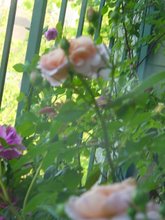After thinking about my previous post and also my original intention it seems fair to say that "mathematical narrative" is not exactly accurate in describing what I want to do. At least not in the way I sketched out in my previous post where I would go through each area of mathematics and write a narrative about it. Instead I would like to free myself of any such expectations and simply write about mathematics as I see it in any way that is most convenient at the moment.
Today I would like to share my thoughts on the topic of the organization of numbers. There are a number of issues which immediately spring to my mind. The first has to do with how to count. Which system should I useto count? Should I use a base of 1, 2, 3, 4, 10, 16, 32, etc. Base 2 counting system is the familiar old binary system. Base 10 is our decimal system. Base 16 is the hexadecimal system of counting. If we step back a minute we realize that this base business at least in one respect has to do with the idea of the modulus operator and congruences. All numbers in each system is thought of in terms of that base. Each digit used to express a number in a particular system are the ones allowed by the base number of that system. In binary we have just the two options for digits to express all the numbers: 0 and 1. In decimal we have 0 through 9 to express all the numbers of infinity. This brings up the idea of cycles. We literally cycle through our digit options until we exhaust them. Then we start a new digit location and cycle through our digit options again until we exhaust them. In this way we get the idea of permutations.
If we change our focus and look at numbers again we can use the following characteristics to get some sort of initial handle on them. For example, when we think of integers (positive and negative numbers) we get the ideas of reflection and mirroring and the notion of using zero as the location for the "line" of reflection. If we think about rational numbers we get the idea of containment, precision, discreteness, compactness, well-defined. If we think about irrational numbers we get what cannot be well-defined. If we think about odd numbers and even numbers again we are visiting the ideas of modulus operator but this time in a more sophisticated guise of an equation. With Complex numbers again we use an equation to describe numbers: we have the real numbers (a and b in the equation to follow) and the imaginary number (i) combined to give us the classic definition of a composite number,z: z = a + bi.
With this slight exploration I feel there is a rhythm , pattern for mathematical concepts, structures, and techniques. There are so many concepts I haven't delved into and woven into my discussion but I think I will leave that for a later date. For example there are the concepts of shape, space, equation in addition to the numerous details for each of the ideas I have introduced which I have left out.



